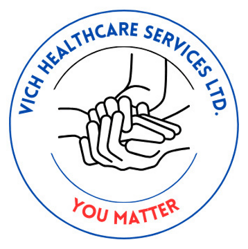VICH CARE'S Information Corner
Breaking the Silence: Let's Talk About Incontinence Management
Incontinence is a common issue that affects millions of people, yet it remains a topic shrouded in silence and stigma. It's time to break the silence and start a conversation about incontinence management. Our campaign aims to raise awareness, provide support, and offer solutions for those dealing with incontinence.#
Understanding Incontinence
Incontinence is the involuntary loss of bladder or bowel control. It can affect anyone, regardless of age or gender, and can significantly impact daily life. Despite its prevalence, many suffer in silence due to embarrassment or lack of information.
Why Talk About Incontinence?
Remove the Stigma: By talking openly about incontinence, we can reduce the shame and embarrassment often associated with it.
Provide Education: Many people are unaware of the causes and treatments available for incontinence. Knowledge is power, and understanding the condition can lead to better management.
Offer Support: Sharing experiences and tips can create a supportive community where individuals feel less isolated.
Our Campaign Goals
Raise Awareness: Through social media, community events, and informative sessions, we aim to educate the public about incontinence.
Provide Resources: Offering access to medical professionals, informational materials, and practical advice for managing incontinence.
Encourage Open Dialogue: Creating safe spaces for people to share their experiences and seek help without judgment.
How You Can Participate
Share Your Story: Personal stories can inspire others and show that they are not alone.
Join the Conversation: Engage with us on social media using the hashtag #BreakTheSilence and attend our events.
Educate Yourself and Others: Learn about incontinence and share the information with your community.
Incontinence Management Solutions
Lifestyle Changes: Dietary adjustments, pelvic floor exercises, and scheduled toilet trips can help manage symptoms.
Medical Treatments: Consult with healthcare providers about medications, physical therapy, or surgical options.
Products and Aids: From absorbent pads to specially designed underwear, there are numerous products available to help manage incontinence discreetly and comfortably.
Support and Resources
Support Groups: Connect with others who understand what you’re going through.
Professional Help: Access to doctors, nurses, and specialists who can provide tailored advice and treatment plans.
Educational Materials: Brochures, articles, and online resources to help you understand and manage incontinence.
Join Us in Breaking the Silence
Incontinence is nothing to be ashamed of, and managing it effectively can greatly improve quality of life. Let’s break the silence together and foster a community of support, understanding, and empowerment. Visit our website, attend our events, and engage with our content to learn more about incontinence management and support those affected by it.
Together, we can create a world where everyone feels comfortable talking about and managing incontinence. Let’s start the conversation today.


Image provided by Ontex Healthcare, (September 2018)
The Importance of Intimate Hygiene
The Importance of Intimate Hygiene
Maintaining good intimate hygiene is essential for overall health and well-being, yet it is often overlooked. Proper intimate hygiene is not only crucial for personal comfort but also plays a significant role in preventing infections and ensuring the health of the reproductive system. In this blog, we will delve into key practices and tips for maintaining proper genital hygiene, helping you stay healthy and comfortable.
Gentle Cleansing with Water:
Avoid using soaps or shower gels on your genitals, as they can cause dryness, itching, and irritation. Instead, use plain water or an emollient (such as aqueous cream, diprobase, or double base) to wash the area1.
Rinse thoroughly after washing.
Avoid Overwashing:
Wash your genitals as necessary depending on your continance circumstances. Overwashing can disrupt the natural balance of healthy bacteria and lead to symptoms.
Don’t douche, as it can wash away beneficial bacteria and increase the risk of infections1.
Pubic Hair Care:
Pubic hair serves as protection against external irritants. Avoid excessive shaving or hair removal, which can cause skin irritation and infections.
Keep the area clean and trimmed, but don’t remove all the hair1.
Sanitary Wear:
Use sanitary towels and tampons only during your period. Wearing them at other times can prevent your skin from breathing and lead to soreness and itching.
Change underwear frequently if you have normal vaginal secretions1.
Barrier Creams and Moisturizers:
For non-broken skin, consider using barrier creams like Medi Derma-S Total Non-Sting Film or Medi Honey.
Proshield Plus Skin Protect and Proshield Foam are suitable for broken skin.
Apply these products as needed to protect and soothe the skin1.
Incontinence Products:
Use pull-up pants (e.g., Tena ProSkin or Nateen) and panty liners to manage incontinence.
Change wet pull-ups promptly to prevent skin damage.
Urine and Bowel Movement:
Urine and feces can cause skin burns and pressure sores. Encourage clients to use the toilet promptly.
Check their pads discreetly to maintain their dignity and privacy.
It is essential to discuss incontinence, as it is often associated with stigma. This highlights the need for more awareness campaigns and open discussions about this sensitive topic that affects many adults. Remember, good intimate hygiene contributes to overall comfort, health, and confidence. It’s a simple yet crucial aspect of self-care that everyone can prioritize2
References








Caring
Compassionate services tailored to meet your unique needs.
Support
Contact
carelink
© 2024. All rights reserved.
Mobile: 07411761156/ 07493697945 (UK)
